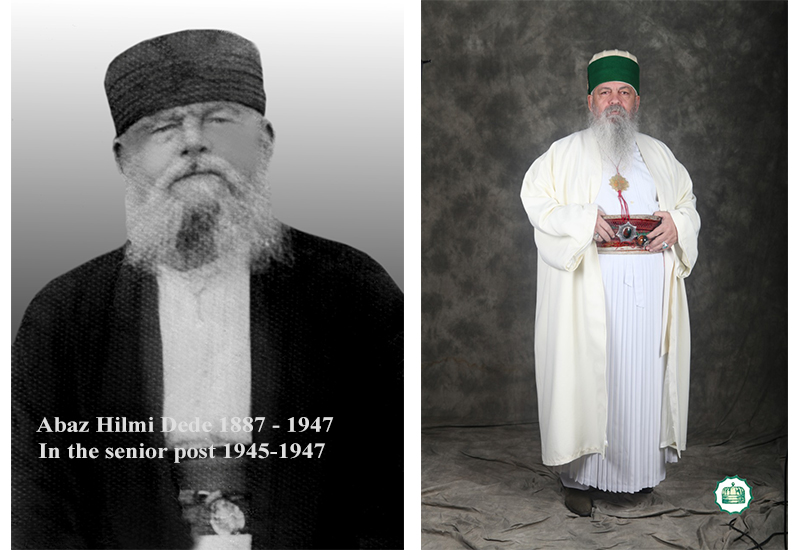
Today, millions of Bektashis around the world commemorate a landmark event, the 134th anniversary of the birth of the former Bektashi World Leader, Dede Abaz Ilmiu. On this day, in the message he gives, the Bektashi World Leader, His Grace, Haxhi Dede Edmond Brahimaj, appreciates the patriotic and religious contribution of this well-known cleric. “Dede Abaz Ilmiu, was and martyr for millions of Bektashi believers around the world, a martyr on the path of purity… At a time when the independent Albanian state was growing through wild grievances, through dangers that came from the appetites of chauvinist neighbors, dede Abaz Ilmiu continued to convey in the courtyard of the tekkes the great message of the unification of the Albanians. Deep down, this prominent cleric had realized that if hearts and shoulders were united, there would be no storm that would divide us Albanians. Therefore, in the most prominent moments of our history, he joined the Albanian nationalists, always planting hope “- affirms, among others, in his message, Dede Edmond Brahimaj.
Dede Abaz Ilmiu, came to this life, on March 13, 1887, in the village of Mërtiaj of Përmet. He spent his childhood, until the age of 17, in his native village. He experienced these years with difficulty, because his father died when he was 2 years old. The uncles who raised him gave him education and love for God and the homeland. He often went to the Mecca of Mertinj and Benja with his family relatives. Every Sunday, during the shopping days, he went to the tekke of Këlcyrë, Suka, as well as to the tekke of Përmet and Alipostivan during the week. From conversations and meetings with dervishes and fathers, in the tekkes of the province of Deshnica, Abazi learned about the path of the Bektashi faith. Thus, he was educated with the love of God and the bright path of Haxhi Bektash Veliu. From the beginning, Dëshnica had tekkes, tombs and holy places such as the Tekkes of Frashër, Përmet, Ali Postivan, Këlcyra, Suka, Kiçok, Bubës; mekamet in Tolar, Leskovec, Xhanaj, Mërtinj, Bënj, Mazhan, Vinokash, Kosinë, Petran etc. With this daily spirit, he received religious culture, respect and love in God. He showed a desire to dress in Bektashi clothes. Going to the tekke of Prishta where there was family friendship deeply affected the soul, in this great refuge of Albanian Bektashism. In 1905, he took over and according to the canonical rules of Bektashism, he became a dervish in the tekke of Prishta, at Father Shabani, together with Ali Skëndaj (father Ali Turabiu). Shocking and macabre events in Southern Albania in 1914, when was burned and destroyed the tekkes in Gjirokastra, Delvina, Borsh, Përmet, Skrapar, Berat, Korca, Kolonja. In these difficult conditions, dervish Abazi, together with dervish Ali and father Shabani, went to Vlora and then emigrated to Egypt, where they stayed for about 3 years. Here died their myrshid, father Shabani from the village of Buz of Tepelena. Later they returned to the tekke of Prishta, which they repaired and resumed its former activity. Dervish Abazi served for a long time in the tekke of Prishta, later in that of Suka and Frashër. In 1920, he contributed to the Vlora war. Dervish Abazi, led the volunteers of Këlcyrë-Përmet in the fighting that took place in the Castle of Tepelena and cooperated closely with father Ahmet Turani, who was the organizer of the National Salvation Committee of the South, as well as with Selam Musa, all the way to Vlora.
In September 1920, in his native village, he set up the first Albanian school in the province of Deshnica, where children from the village of Sevran in Skrapar also came. He helped in the anti-fascist war and turned the famous Frashëri tekke into a food aid and shelter for the freedom fighters, as well as helping to liberate the Frashëri area, in the tradition of the Frashëri brothers. His contribution also appears in the organization of Bektashi assemblies, from the Congress of Prishta in January 1921 until the IV Bektashi congress, in 1945, in Tirana. The period 1905-1942, for dervish Abazi, was a real school, the school of spiritual education, the school of patriotism. He learned from the difficult life of his childhood, the lessons in the tekke of Prishtina and especially in the tekke of Kajusa Sultan in Egypt, where he received the necessary theological lessons. His stay with the believers in the tekkes of Prishta, Suka, Frashër, pilgrimages, numerous readings, cultured him and he gained an excellent experience as a Bektashi cleric. He made taps and helped to settle quarrels, grievances everywhere in the community. In June 1942 he received the religious rank of “Father” and then “Grandfather”, in the tekke of Frashër, where he served until 1945. In his figure, people saw the clergyman of good will, who preached and radiated kindness, peace, love and respect for the people, manifested brotherhood and harmony, cooperation and tolerance between different religious communities. In this path of Bektashism, in the years 1945-47, Dede Abazi managed to become a spiritual leader. Life and hardships wherever he served, formed him as a skilled cleric and organizer, where he distinguished himself for the cause of the homeland in aid of the anti-fascist war. For these merits and as an experienced clergyman, at the age of 58, on September 2, 1945, the Paternal and General Council elected him World Leader and Grandfather of the Albanian Bektashi Community.
He performed this task best and was distinguished for his deep love for the Albanian believers, also of every faith. He followed in the footsteps of his ancestors, considering Bektashism as a wisdom and faith for the believers in all Albanian territories, in Montenegro, Kosovo, Macedonia and even in the regions of Chameria. He remained faithful to Bektashi customary principles and codes to the end. He was a participant in all Bektashi congresses, distinguished himself and took care that the Bektashi doctrine gained new visions, but without disturbing the purity descended from nearly 800 years, applying the sermons of Haxhi Bektash Veliu that “You must educate the body, the heart and the soul to know God ”.
After the communist regime came to power, it decided to gradually weaken religious institutions, subjugate them to the state, use them for as long as they supported the government’s program, and then abolish them. This was a long-term strategy 1945-1967.
The creation of the “Progressive Group” for reform in the matter of marriage, clothing by Father Faja and Father Fejzo, where there was also the influence of power, was opposed by Dede Abazi and some clerics. This led to the tragic event of March 18, 1947…. With the reopening of the Bektashi World Headquarters after the political changes of 1990, under the auspices of the former World Leader, dede Reshat Bardhi, in the tombs at the Holy See, in June 1993, among the remains of the dedelers Sali Niazi Dede, Xhafer Sadik Dede, Ali Riza Dede, Kamber Ali Dede, Ahmet Myftar Dede, those of Abaz Hilmi Dede were also settled. Abaz Hilmi Dede, was given by the President of the Republic the Order (after death) for Patriotic activities of Class I with this motivation: “For his contribution towards the spiritual purification of believers and their patriotic education, sworn enemy of communism” .
BEKTASHIAN WORLD GRANDFATHER, HIS GRACE,
HAXHI DEDE EDMOND BRAHIMAJ FOR DEDE ABAZ ILMIUN:
Dede Abaz Ilmiu, was and remains to be for millions of Bektashi believers all over the world, a martyr on the path of chastity… At a time when the independent Albanian state was growing through wild grievances, through dangers coming from the appetites of chauvinist neighbors, Ilmiu continued to convey in the courtyard of the tekkes the great message of the unification of the Albanians. Deep down, this prominent cleric had realized that if hearts and shoulders were united, there would be no storm that would divide us Albanians. Therefore, in the most prominent moments of our history, he joined the Albanian nationalists, always sowing hope.
Father Abaz Ilmiu was not only a religiously capable leader, but also an organizer of the patriotic movement. It is a well-known fact that in 1920, in collaboration with his father Ahmet Turani, they organized an excellent resistance against the Italians not only inside Tepelena but also in Labëria. In the ranks of patriotic detachments, were undoubtedly Bektashi myhibs and benefactors. Even in the years that followed, Father Abazi participated in all our national efforts to consolidate and protect the integrity of the borders, as well as to keep alive and further develop our national culture. The permanent friend of religious books, but also of world and Albanian literature, father Abazi, would take the initiative to open the first primary school in the distant Mertin, and would even pay from the money given to him, the first teachers of this school. He also attended all Bektashi congresses from 1921 to 1945, giving considerable consideration to his religious and life experience.
Prepared by:
Nuri ÇUNI
Kujtim BORIÇI
